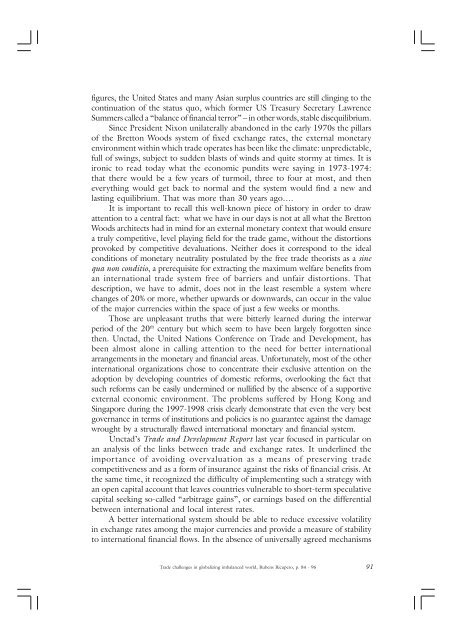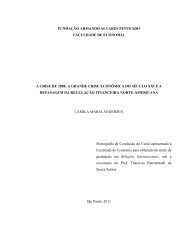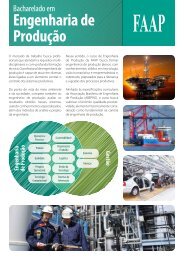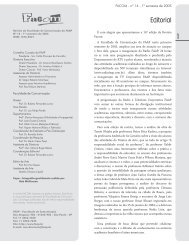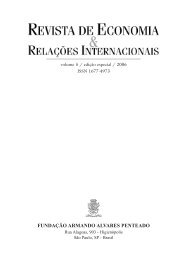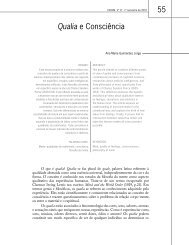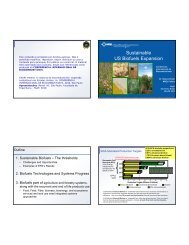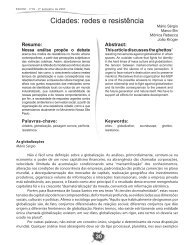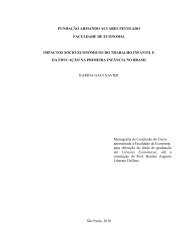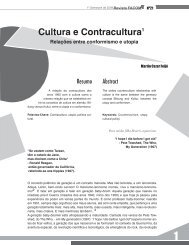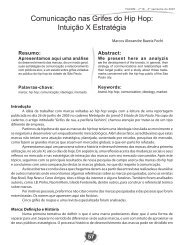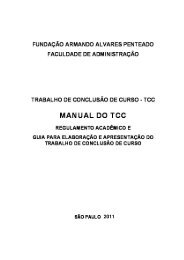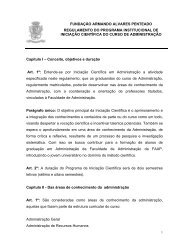Número 8 - Janeiro 2006 - Faap
Número 8 - Janeiro 2006 - Faap
Número 8 - Janeiro 2006 - Faap
Create successful ePaper yourself
Turn your PDF publications into a flip-book with our unique Google optimized e-Paper software.
figures, the United States and many Asian surplus countries are still clinging to the<br />
continuation of the status quo, which former US Treasury Secretary Lawrence<br />
Summers called a “balance of financial terror” – in other words, stable disequilibrium.<br />
Since President Nixon unilaterally abandoned in the early 1970s the pillars<br />
of the Bretton Woods system of fixed exchange rates, the external monetary<br />
environment within which trade operates has been like the climate: unpredictable,<br />
full of swings, subject to sudden blasts of winds and quite stormy at times. It is<br />
ironic to read today what the economic pundits were saying in 1973-1974:<br />
that there would be a few years of turmoil, three to four at most, and then<br />
everything would get back to normal and the system would find a new and<br />
lasting equilibrium. That was more than 30 years ago….<br />
It is important to recall this well-known piece of history in order to draw<br />
attention to a central fact: what we have in our days is not at all what the Bretton<br />
Woods architects had in mind for an external monetary context that would ensure<br />
a truly competitive, level playing field for the trade game, without the distortions<br />
provoked by competitive devaluations. Neither does it correspond to the ideal<br />
conditions of monetary neutrality postulated by the free trade theorists as a sine<br />
qua non conditio, a prerequisite for extracting the maximum welfare benefits from<br />
an international trade system free of barriers and unfair distortions. That<br />
description, we have to admit, does not in the least resemble a system where<br />
changes of 20% or more, whether upwards or downwards, can occur in the value<br />
of the major currencies within the space of just a few weeks or months.<br />
Those are unpleasant truths that were bitterly learned during the interwar<br />
period of the 20 th century but which seem to have been largely forgotten since<br />
then. Unctad, the United Nations Conference on Trade and Development, has<br />
been almost alone in calling attention to the need for better international<br />
arrangements in the monetary and financial areas. Unfortunately, most of the other<br />
international organizations chose to concentrate their exclusive attention on the<br />
adoption by developing countries of domestic reforms, overlooking the fact that<br />
such reforms can be easily undermined or nullified by the absence of a supportive<br />
external economic environment. The problems suffered by Hong Kong and<br />
Singapore during the 1997-1998 crisis clearly demonstrate that even the very best<br />
governance in terms of institutions and policies is no guarantee against the damage<br />
wrought by a structurally flawed international monetary and financial system.<br />
Unctad’s Trade and Development Report last year focused in particular on<br />
an analysis of the links between trade and exchange rates. It underlined the<br />
importance of avoiding overvaluation as a means of preserving trade<br />
competitiveness and as a form of insurance against the risks of financial crisis. At<br />
the same time, it recognized the difficulty of implementing such a strategy with<br />
an open capital account that leaves countries vulnerable to short-term speculative<br />
capital seeking so-called “arbitrage gains”, or earnings based on the differential<br />
between international and local interest rates.<br />
A better international system should be able to reduce excessive volatility<br />
in exchange rates among the major currencies and provide a measure of stability<br />
to international financial flows. In the absence of universally agreed mechanisms<br />
Trade challenges in globalizing imbalanced world, Rubens Ricupero, p. 84 - 96<br />
91


